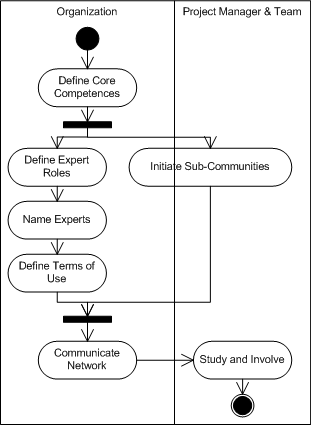| Problem | An organization not knowing how to make available the knowledge and experiences of some of its members to benefit many projects and the whole organization. |
| Initial Context |
An organization having a need to make the existing experience of people more easily available to the whole organization. |
| Roles | Organization represented by some managerial actor responsible for competence management, and a project manager needing knowledge support from the organization. |
| Forces | Establishing an official support person / expert network gives visibility to the knowledge sources and offers better possibilities to utilize those. To share knowledge in an organization, the employees need to know what kinds of knowledge sources are available.
Pulling together persons having similar kinds of problems (like project managers) can give rise to new unofficial support groups in the organization. The fellow employees most probably have already solved some of the problems you have. The role of an unofficial organization should not to be underestimated and it should be treated as a possibility in giving this kind of support. Through cooperation with identified experts it is possible to share tacit knowledge in an organization. Some general rules of using the support are required to avoid a situation where a person tries to delegate his or her tasks to others. |
| Solution |
|
| Resulting Context | Project teams and especially Project Managers in the organization knowing that knowledge support exist and help can be got from named experts. |
| Instances | This pattern is utilized once to arrange this support in an organization and after that always when it needs to be redefined (e.g. changes in core competences).
One potential pitfall is that experts are named but they do not have any time to act in this role while being 100 % assigned to their own projects. |
| Process Connection | Human resources process, competence development. |
